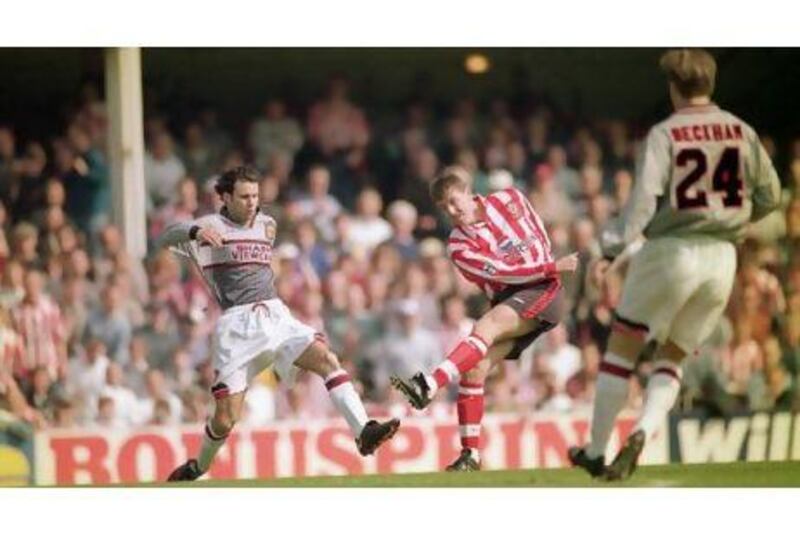The 1970s were the FA Cup's greatest decade for unpredictability. Indeed, perhaps they were English football's supreme spell for connoisseurs of the unlikely: Manchester United, Tottenham and Chelsea spent time in the second division, Aston Villa two years in the third. But its iconic moments came in the season's showpiece: the FA Cup final.
In 1973, aided by an extraordinary save from Jim Montgomery, second-flight Sunderland executed one of the greatest shocks of all, defeating the mighty Leeds at Wembley.
Three years later, a rejuvenated Manchester United defeated champions Derby in the last four in a match their manager Tommy Docherty unwisely declared "the real final". The actual final pitted red-hot favourites against lower-league opponents. And, in the truest cup traditions, the underdog won. Bobby Stokes' late goal secured the only major honour of Southampton's 126-year history.
For Stokes, there was a tragic coda; the midfielder made only another 11 appearances for Saints, spent much of the rest of his life working in a greasy spoon cafe and died of alcoholism at 44. But he is remembered, not least when Southampton meet Manchester United.
A biennial occurrence for long, it is now an infrequent fixture. Since United's victory in May 2005 relegated Southampton, the two clubs have met only once, for an FA Cup tie United won at a canter two years ago. Now, once again, the Bobby Stokes Suite at St Mary's will contain the frisson of excitement that denotes a visit from United.
Despite the vagaries of Cup draws, there may not be another for a while. Like the United team of 1976, Southampton can testify to the burden of favouritism. Few teams attracted such overwhelming pre-season backing as the League One team did last summer. Now they sit fourth in the third tier: not disastrous, but not the anticipated procession to promotion.
The combination of a slow start and Alan Pardew's early-season sacking left them languishing in the lower half of the league for much of the campaign, despite boasting a £1 million (Dh5.8m) striker (in Rickie Lambert) and a £10m-rated prodigy (in teenage winger Alex Oxlade-Chamberlain, watched by Sir Alex Ferguson, among others).
Although results have improved since Nigel Adkins was lured from Scunthorpe to replace Pardew, they are they are discovering that escaping League One has its difficulties. Further down the table, Sheffield Wednesday can share those sentiments.
Quality hasn't always been allied with consistency. Their last encounter with opponents from Greater Manchester ended in a 6-0 victory, though a thrashing of Oldham bears little relevance to a meeting with the Premier League leaders. But since then, Saints have failed to score against Notts County and Tranmere. Adkins, without being ironic, describes Tuesday's game against Exeter as "massive". In one respect, it is more meaningful.
That, now, is their lot in life. For 27 years, however, they were ever-presents in the top flight, peaking when finishing runners-up in 1984. United, two places beneath them then, endured a series of unpleasant afternoons at The Dell, the Saints' former home. They lost in three successive seasons in the 1990s.
The 3-1 setback in April 1996 was the infamous afternoon when Ferguson ordered United to change out of their grey kits at half-time, arguing implausibly that his players were unable to see one another against backdrop of the crowd.
Six months later and wearing blue, they conceded six times to the inspired trio of Matt Le Tissier, Eyal Berkovic and Egil Ostenstad. A repeat now is as improbable as a lower-league side lifting the FA Cup again.
The greater likelihood is that the template was set by United's win in January 2009; a weakened team progressing comfortably.






